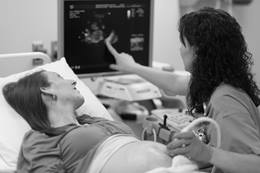High-Risk Pregnancy & Reproductive Health
Statistics have shown a dramatic increase in survival of individuals with congenital heart disease. Today, we expect that most children treated for congenital heart disease will survive to adulthood and lead a full adult life. Thus, more women with congenital heart disease are interested in pregnancy. Although most women with congenital heart disease can successfully carry a pregnancy, some are at substantial risk. We strongly encourage all adolescent girls and women with congenital heart disease to discuss reproductive health care and pregnancy with their OB-GYN doctor and cardiologists, prior to becoming pregnant.
Menstruation
Menarche is the onset of menstrual periods. Compared to adolescent girls without heart disease, menarche occurs slightly later in girls with congenital heart disease, and this is especially true for women with bluish discoloration of the skin, lips, fingernails and tongue (cyanosis). Women with cyanosis may also be more likely to have irregular menstrual periods. All women 18 years of age and older, and particularly those that are sexually active should have annual gynecologic examinations (pelvic, pap smear, breast examination). Gynecological examinations are important for reproductive health, education related to sexuality, sexually transmitted diseases (STDs), pregnancy and birth control options.
Birth Control
Some forms of birth control are not appropriate in women with certain forms of congenital heart disease, and we recommend women discuss the various options with her health care providers to select the safest and most appropriate. In general, women with complex heart disease, cyanosis, or pulmonary hypertension, should not use birth control pills that contain estrogen because there is an increased risk of forming blood clots. Depo-Provera and progesterone only birth control pills may be better alternatives in some patients. Intrauterine devices (IUDs) may place some women at higher risk of endocarditis. These women should be given antibiotics prior to insertion of an IUD. Download our patient education handout to review the reliability, advantages and disadvantages of the more common forms of birth control.
Medications and Pregnancy
Prospective mothers should discuss medication use with experts in OB-GYN, primary care and/or cardiology team prior to becoming pregnant since some medications are potentially harmful to the baby. Moms with heart disease may be advised to continue heart medications when this is healthiest for Mom, and therefore would be healthiest for the baby. It is extremely important to review all medications (prescription and over-the-counter) because many medications used to treat heart problems can adversely affect the baby. Any unnecessary medications are discouraged.
High Risk Maternal-Fetal Health Care
Women with heart disease are advised to receive expert obstetric care from a team experienced with a variety of heart conditions and the effect of pregnancy on those conditions. Such a team is introduced to the mother early in pregnancy, follows the mother and baby during pregnancy and together, plans the induction of labor and delivery. Induction and planned delivery ensure that the appropriate team members are available at the time of delivery. Prior to the planned induction, you will have a chance to discuss anesthesia and method of delivery.

Pregnancy
Pregnancy is a special time in every woman’s life. At around 12 days after conception, an extensive vascular system (placenta) develops to provide nutrients for the baby and eliminates its waste products. The placenta is implanted in the wall of the uterus, where it receives Mother’s blood, and carries out wastes from the baby. The placenta is a barrier that filters out harmful substances to the baby, however not all substances are filtered. Alcohol, viruses and some medications can cross the placenta and can be harmful to the developing baby.
The extra demand for nourishment (oxygen) and removal of wastes increases the work load on the mother’s cardiovascular system. In response to the increased demands, the mother’s heart must beat faster and stronger. As the pregnancy advances toward term, the mother’s cardiovascular demands increase and pregnancy mimics mild exercise. Although most women tolerate pregnancy well, most experience symptoms related to the changes that occur with pregnancy.
Prior to Becoming Pregnant
Women with heart disease are strongly urged to use a reliable form of birth control until they are emotionally and physically ready to become pregnant. Although many women with congenital heart disease can have a successful pregnancy, it is important that you discuss pregnancy with your cardiologist before becoming pregnant. It will be necessary for each potential mother with congenital heart disease to undergo a complete cardiac evaluation prior to becoming pregnant. The evaluation may be as simple as a history and physical examination. In more complex congenital heart disease, the evaluation may also include EKG, echocardiography, transesophageal echocardiography (TEE), stress testing, cardiac MRI or CT scan, Holter monitor, and/or electrophysiology study (EPS). The purpose of the preparatory evaluation is to ensure the healthiest outcome for mother and baby.

